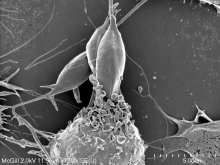But then the human intervened...


Gravitational effects, variations in Earth structure could damp rise in global sea levels

Similar to relative disparities in the United States, although rates lower among both racial groups in Canada

McGill-led team developing new ways of tracking adaptation

A McGill University-led group of researchers (TRAC3) are looking at whether progress is being made in designing initiatives and policies to reduce vulnerability to climate change across countries. Their aim is to contribute new ways of monitoring the global climate adaptation process.

There are believed to be around 1.5 million different species of fungus on Earth, but one mold, known as Aspergillus fumigatus, causes the majority of cases of invasive aspergillosis – a devastating illness that kills 90 per cent of patients with weakened immune systems or lung diseases.

The winner of the 2015 Cundill Prize in Historical Literature at McGill was announced last night at a gala awards dinner held in Toronto. Now in its eighth year, the Cundill Prize is the world’s most lucrative international award for a nonfiction book. The Guardians took home the top prize of US$75,000.

A new study led by researchers in Canada sheds light on the effects of off-label use of prescription drugs with the first-ever investigation in adult populations.

McGill once again ranked first in the “medical-doctoral” category in student awards; budget spent on scholarships and bursaries; and social-sciences and humanities grants, relative to faculty size.

$1 million donation from Trottier Family Foundation to fund McGill Space Institute fellowships

Head movements play an important role in conveying emotions through speech and music. Let your head do the talking.
A $3.4 million gift from McGill alumnus and long-time university supporter, Dr. Yan P. Lin, PhD’92, will establish an innovative interdisciplinary centre to explore the history and development of the fundamental ideas, systems and institutions which govern our lives.

A new study led by researchers at the Montreal Neurological Institute and Hospital of McGill University and the MUHC, gets closer to identifying the mechanisms responsible for multiple sclerosis and makes headway in the search for better treatments.

Discovery explains how Leishmania parasite boosts its infection

